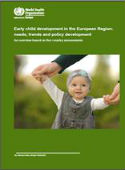Early child development in the European Region: needs, trends and policy development

Download
An overview based on five country assessments
Early childhood is the period of most extensive (and intensive) parental responsibilities related to all aspects of children’s well-being covered by the Convention: their survival, health, physical safety and emotional security, standards of living and care, opportunities for play and learning, and freedom of expression. Accordingly, realizing children’s rights is in large measure dependent on the well-being and resources available to those with responsibility for their care. Recognizing these interdependencies is a sound starting point for planning assistance and services to parents, legal guardians and other caregivers. State parties are required to render appropriate assistance to parents, legal guardians and extended families in the performance of their child-rearing responsibilities (arts. 18.2 and 18.3), including assisting parents in providing living conditions necessary for the child’s development (art. 27.2) and ensuring that children receive necessary protection and care (art. 3.2)
(United Nations General Assembly, General Comment No.7, 2005)



